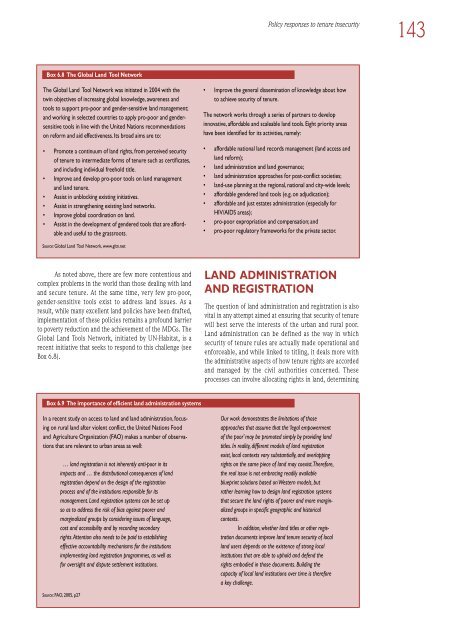Global Report on Human Settlements 2007 - PoA-ISS
Global Report on Human Settlements 2007 - PoA-ISS
Global Report on Human Settlements 2007 - PoA-ISS
Create successful ePaper yourself
Turn your PDF publications into a flip-book with our unique Google optimized e-Paper software.
Policy resp<strong>on</strong>ses to tenure insecurity<br />
143<br />
Box 6.8 The <str<strong>on</strong>g>Global</str<strong>on</strong>g> Land Tool Network<br />
The <str<strong>on</strong>g>Global</str<strong>on</strong>g> Land Tool Network was initiated in 2004 with the<br />
twin objectives of increasing global knowledge, awareness and<br />
tools to support pro-poor and gender-sensitive land management;<br />
and working in selected countries to apply pro-poor and gendersensitive<br />
tools in line with the United Nati<strong>on</strong>s recommendati<strong>on</strong>s<br />
<strong>on</strong> reform and aid effectiveness. Its broad aims are to:<br />
• Promote a c<strong>on</strong>tinuum of land rights, from perceived security<br />
of tenure to intermediate forms of tenure such as certificates,<br />
and including individual freehold title.<br />
• Improve and develop pro-poor tools <strong>on</strong> land management<br />
and land tenure.<br />
• Assist in unblocking existing initiatives.<br />
• Assist in strengthening existing land networks.<br />
• Improve global coordinati<strong>on</strong> <strong>on</strong> land.<br />
• Assist in the development of gendered tools that are affordable<br />
and useful to the grassroots.<br />
• Improve the general disseminati<strong>on</strong> of knowledge about how<br />
to achieve security of tenure.<br />
The network works through a series of partners to develop<br />
innovative, affordable and scaleable land tools. Eight priority areas<br />
have been identified for its activities, namely:<br />
• affordable nati<strong>on</strong>al land records management (land access and<br />
land reform);<br />
• land administrati<strong>on</strong> and land governance;<br />
• land administrati<strong>on</strong> approaches for post-c<strong>on</strong>flict societies;<br />
• land-use planning at the regi<strong>on</strong>al, nati<strong>on</strong>al and city-wide levels;<br />
• affordable gendered land tools (e.g. <strong>on</strong> adjudicati<strong>on</strong>);<br />
• affordable and just estates administrati<strong>on</strong> (especially for<br />
HIV/AIDS areas);<br />
• pro-poor expropriati<strong>on</strong> and compensati<strong>on</strong>; and<br />
• pro-poor regulatory frameworks for the private sector.<br />
Source: <str<strong>on</strong>g>Global</str<strong>on</strong>g> Land Tool Network, www.gltn.net<br />
As noted above, there are few more c<strong>on</strong>tentious and<br />
complex problems in the world than those dealing with land<br />
and secure tenure. At the same time, very few pro-poor,<br />
gender-sensitive tools exist to address land issues. As a<br />
result, while many excellent land policies have been drafted,<br />
implementati<strong>on</strong> of these policies remains a profound barrier<br />
to poverty reducti<strong>on</strong> and the achievement of the MDGs. The<br />
<str<strong>on</strong>g>Global</str<strong>on</strong>g> Land Tools Network, initiated by UN-Habitat, is a<br />
recent initiative that seeks to resp<strong>on</strong>d to this challenge (see<br />
Box 6.8).<br />
LAND ADMINISTRATION<br />
AND REGISTRATION<br />
The questi<strong>on</strong> of land administrati<strong>on</strong> and registrati<strong>on</strong> is also<br />
vital in any attempt aimed at ensuring that security of tenure<br />
will best serve the interests of the urban and rural poor.<br />
Land administrati<strong>on</strong> can be defined as the way in which<br />
security of tenure rules are actually made operati<strong>on</strong>al and<br />
enforceable, and while linked to titling, it deals more with<br />
the administrative aspects of how tenure rights are accorded<br />
and managed by the civil authorities c<strong>on</strong>cerned. These<br />
processes can involve allocating rights in land, determining<br />
Box 6.9 The importance of efficient land administrati<strong>on</strong> systems<br />
In a recent study <strong>on</strong> access to land and land administrati<strong>on</strong>, focusing<br />
<strong>on</strong> rural land after violent c<strong>on</strong>flict, the United Nati<strong>on</strong>s Food<br />
and Agriculture Organizati<strong>on</strong> (FAO) makes a number of observati<strong>on</strong>s<br />
that are relevant to urban areas as well:<br />
… land registrati<strong>on</strong> is not inherently anti-poor in its<br />
impacts and … the distributi<strong>on</strong>al c<strong>on</strong>sequences of land<br />
registrati<strong>on</strong> depend <strong>on</strong> the design of the registrati<strong>on</strong><br />
process and of the instituti<strong>on</strong>s resp<strong>on</strong>sible for its<br />
management. Land registrati<strong>on</strong> systems can be set up<br />
so as to address the risk of bias against poorer and<br />
marginalized groups by c<strong>on</strong>sidering issues of language,<br />
cost and accessibility and by recording sec<strong>on</strong>dary<br />
rights.Attenti<strong>on</strong> also needs to be paid to establishing<br />
effective accountability mechanisms for the instituti<strong>on</strong>s<br />
implementing land registrati<strong>on</strong> programmes, as well as<br />
for oversight and dispute settlement instituti<strong>on</strong>s.<br />
Our work dem<strong>on</strong>strates the limitati<strong>on</strong>s of those<br />
approaches that assume that the ‘legal empowerment<br />
of the poor’ may be promoted simply by providing land<br />
titles. In reality, different models of land registrati<strong>on</strong><br />
exist, local c<strong>on</strong>texts vary substantially, and overlapping<br />
rights <strong>on</strong> the same piece of land may coexist.Therefore,<br />
the real issue is not embracing readily available<br />
blueprint soluti<strong>on</strong>s based <strong>on</strong> Western models, but<br />
rather learning how to design land registrati<strong>on</strong> systems<br />
that secure the land rights of poorer and more marginalized<br />
groups in specific geographic and historical<br />
c<strong>on</strong>texts.<br />
In additi<strong>on</strong>, whether land titles or other registrati<strong>on</strong><br />
documents improve land tenure security of local<br />
land users depends <strong>on</strong> the existence of str<strong>on</strong>g local<br />
instituti<strong>on</strong>s that are able to uphold and defend the<br />
rights embodied in those documents. Building the<br />
capacity of local land instituti<strong>on</strong>s over time is therefore<br />
a key challenge.<br />
Source: FAO, 2005, p27

















